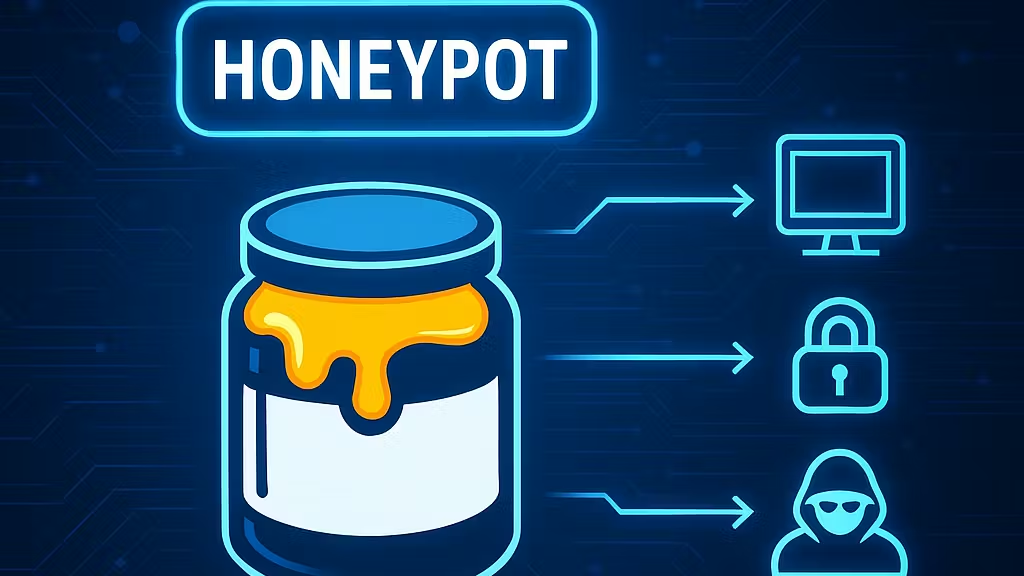Discovering the Hidden Wiki scandals? Learn about the 12 most horrific scandals on the dark web by reading this article.
Hidden Wiki Scandals Found on the Dark Web
One well-known gateway to the deep web and dark web is the Hidden Wiki. Numerous illicit activities, open discussion forums, platforms for supporting whistleblowers, research and educational materials, banned data, scandals, and controversies have all been linked to the dark web and deep web.
Red rooms, child pornography, human trafficking, and many more illicit activities may be found on the dark web. Nonetheless, the controversies and scandals have shown the dangers, repercussions, and lessons that may be learned from using the hidden Wiki.
Here, we’ve provided a compilation of horrific dark web incidences and hidden Wiki scandals.
1. Silk Road

The well-known dark web market connected to the secret Wiki is called the Silk Road. Ross Ulbricht established it, and it operated from 2011 to 2013. Drugs, firearms, and other illegal items and services were traded in this scandalous marketplace, where dealers offered their commodities much as they would on Amazon and eBay. It generates more than 9 million bitcoins (BTC) in income.
Nonetheless, the Silk Road controversy brings to light the challenges that law enforcement faces when conducting illegal actions on the dark web. By looking into his operational security and system errors, Ross Ulbricht was apprehended in 2013. For creating and running the scandalous bazaar, he received a life sentence.
2. No Love Deep Web Reality Game
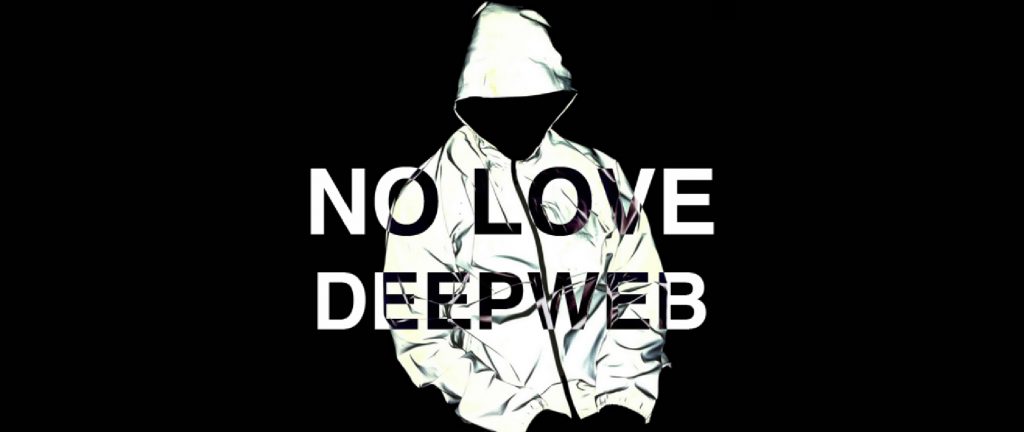
No Love Deep web reality game is one of the unsettling hidden wiki scandals associated with the dark web. The avant-garde hip-hop band Death Grips devised a novel marketing scheme to promote their new album, “No Love Deep Web,” which caught listeners’ attention. In August 2012, they launched a treasure hunt alternative reality game (ARG) on the dark web. Players are drawn into a complex conundrum that blurs the boundaries between the real and virtual worlds.
This game brought to mind the infamous Cicada 3301 deep web scavenger hunt puzzles, which were infamous for their intricate design and extensive use of encryption methods. Death Grips’ ARG employed a variety of cryptographic encryption techniques, including the Caesar cipher, QR codes, and Morse code, to conceal the hints. Participants in this treasure hunt had to decode messages using a variety of talents. Participants must also follow the band’s trail because hints were strategically positioned throughout several ominous websites.
This advanced game served as a marketing tool for “No Love Deep Web,” not as a recruitment attempt for a clandestine organization or criminal plot. In addition to building anticipation for their upcoming album, Death Grips interacted with their audience in a manner that mirrored the subversive, technological, and paranoid elements present in the album. This innovative record advertising tactic capitalized on the dark web’s cryptic qualities to generate a sense of exclusivity and mystery surrounding the release.
3. Evite Blackmailing
In 2019, the major social planning service platform Evite was compromised. Millions of users’ personal information, including names, email addresses, phone numbers, dates of birth, and physical postal addresses, was stolen in this incident.
Instead of making the data publicly available, the hackers wanted $1,900 in Bitcoin (BTC) from the Evite firm. The hackers began selling the data on the dark web marketplaces when the corporation declined to pay. According to the hacker, 10 million stolen records are for sale.
The Evite firm claims that the incident did not expose any financial information or Social Security numbers. Additionally, the business sent consumers an email informing them of the data breach and outlining the precautions they could take to safeguard their data.
4. Petter Scully

It is one of the dark web’s most horrifying hidden wiki scandals. From 2011 until 2014, Peter Gerard Scully, his girlfriend Lovely Margallo, and their two associates, Maria Durotiya Chia and Alexander Lao, detained and mistreated children in Cagayan de Oro. Teenage females, kids, and toddlers were among the casualties.
In addition, Peter Scully recorded the girls from low-income households while raping, torturing, and sexually abusing them. He would post the movies on “No Limits Fun,” a dark web porn website, and charge up to $10,000 for each watch.
In the Philippines, Peter Gerard Scully was found guilty of 60 crimes and given a 129-year jail term. Torture, murder, child abuse, human trafficking, child pornography, and rape are among the allegations. He committed all of these heinous and terrible deeds, documented them, and posted them on the dark web community.
5. Freedom Hosting
On the dark web, Freedom Hosting is a well-known hosting provider. It is renowned for making it easier to store and distribute all of the illicit information found on different websites. Eric Eoin Marques, a native, developed this hosting service. There are at least 8.5 million pictures of child sexual abuse material (CSAM) on the Dark Web, according to Eoin Revenue.
When the FBI shut down Freedom Hosting in 2013, the Hidden Wiki scandals surfaced because a large amount of this hosting service was linked to child pornography. However, police authorities confiscated $155,000 from Marques and held it in custody, and Marques was sentenced to 27 years in federal prison.
6. Operation Onymous
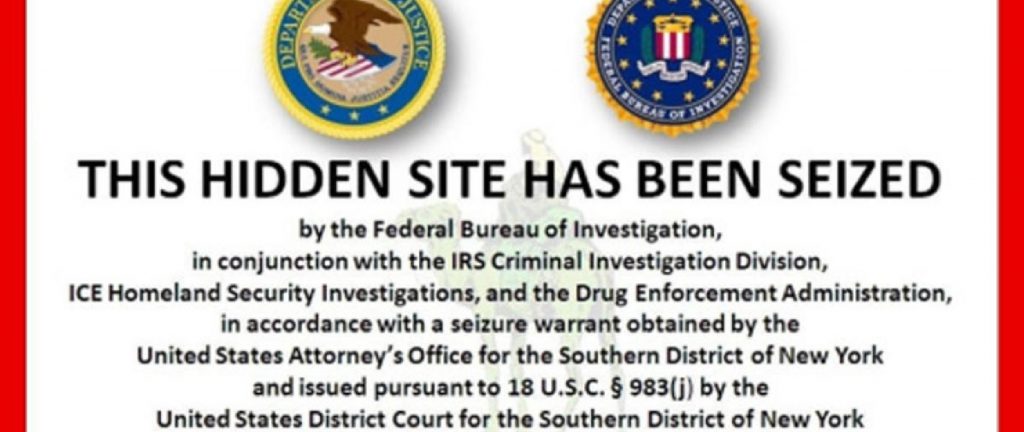
Operation Onymous was another one of the hidden wiki scandals. It first surfaced in 2014 when European nations, including the United States of America, joined forces with international law enforcement to launch Operation Onymous. This operation’s goal was to dismantle several Dark Web markets involved in illicit activity.
Silk Road 2.0 was among the more than 400 well-known dark net marketplaces that were taken down. As a result of Operation Onymous, 17 people who ran darknet websites were arrested, and $1 million worth of Bitcoin (BTC), 180,000 euros in cash, narcotics, gold, and silver were seized. Authorities did not, however, reveal the full list of unlawful websites they had taken down. However, it appears that this operation has shut down over 20% of all dark websites.
The investigation demonstrates how law enforcement organizations aim to identify and stop illicit activity on the dark web. It also emphasized how foreign authorities can combat cybercrime by collaborating and exchanging intelligence.
7. Ashley Madison

A cautionary story concerning the possible repercussions of entrusting sensitive data to internet sites is the Ashley Madison data leak. But the hidden Wiki has nothing to do with this controversy. In 2015, a major data breach at the dating service Ashley Madison, which serves those seeking extramarital encounters, revealed the financial and personal information of 37 million customers. Credit card transactions, usernames, email addresses, and other documents are among the 10 terabytes of data that were published on the dark web server and are stored in the downloadable cache. Concerns about data security, privacy violations, and the long-term consequences for persons affected by such breaches were raised by the Hidden Wiki scandals data leak.
8. Child Exploitation Networks
Child exploitation networks include forums, websites, and peer-to-peer networks devoted to creating, sharing, and consuming child sexual abuse materials (CSAM). These platforms commonly employ stringent access controls, including invitation-only memberships, cryptocurrency payments, and the use of encryption technologies to protect user identities and maintain privacy. In addition, sharing content on social media is illegal. However, it also prolongs the trauma and victimization of children who have experienced sexual abuse, causing serious harm.
Law enforcement agencies attempting to penetrate and dismantle networks that abuse minors face significant challenges due to the dark web’s privacy-preserving anonymity features. However, international collaboration and developments in digital forensics have led to several well-known successes. Operations such as Operation Delego and Operation Blackwrist have resulted in the rescue of many victims and the identification and capture of individuals participating in these networks.
In these investigations, law enforcement organizations have employed a variety of tactics. Such as circumventing anonymity protections through hacking, undercover work, and court-approved network investigative techniques (NITs).
9. Edward Snowden
Former CIA and NSA employee Edward Snowden made headlines in 2013 after he came forth with information concerning the government’s widespread monitoring of the populace. He posted the PRISM investigative program’s records and information to the dark web. Furthermore, he said that tens of millions of Americans’ phone records were being gathered by the US National Security Agency (NSA).
But Snowden fled the US right away, and when traveling via Russia, where he applied for political asylum, his passport was revoked. He now calls this place his permanent home. He sparked the discussion about widespread monitoring, but his acts are still irritating. Additionally, it brought attention to the possible misuse of government authority and the extent to which they will go to prevent the public from learning about the data.
10. Operation DisrupTor
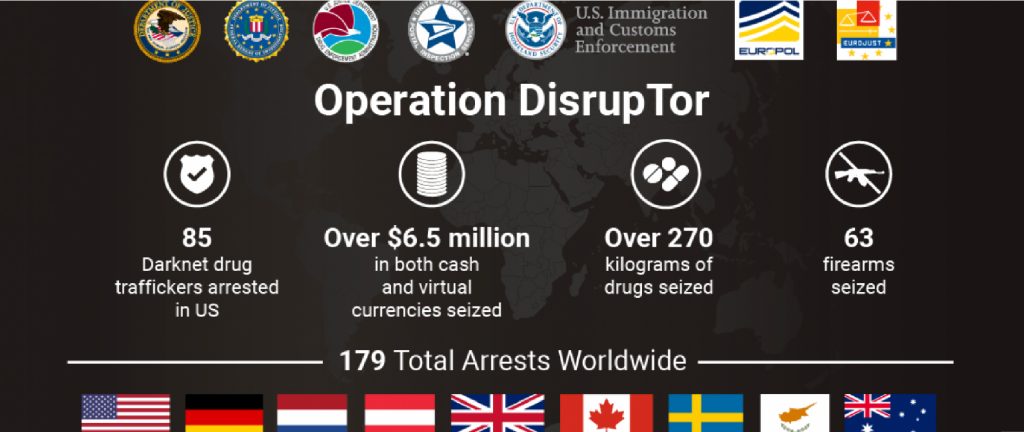
Operation DisrupTor, an unprecedented worldwide law enforcement initiative, seeks to dismantle the networks that trade weapons, narcotics, and other illicit goods on the dark web.
Intensive collaboration between the FBI, DEA, Europol, and other European and American organizations resulted in the operation. The efficiency of cross-border cooperation intelligence sharing and operations planning in locating and dismantling online criminal networks was shown by Operation DisrupTor.
The impact of Operation DisrupTor was enormous since hundreds of individuals were apprehended worldwide. Millions of dollars’ worth of cash and cryptocurrencies were seized as part of the operation, along with large quantities of firearms and narcotics. The operation targeted buyers and vendors on several dark web marketplaces, disrupting the supply networks of illegal goods and services. It reveals the flaws in even the most clandestine internet crime schemes.
The operation’s effectiveness depended on using state-of-the-art cyber investigative techniques and technologies to find the actual identities of dark web users. Law enforcement agencies used the digital footprints left by talks and transactions on the black web, notwithstanding the various degrees of anonymity provided by Tor and encryption. This painstaking detective work was improved by entering into online criminal networks and utilizing data from previous investigations.
11. The Hitman Scams on the Dark Web

A collection of websites that provide hitman services for rent may be found on the dark web. Because of the Dark Web’s reputation, many individuals think they could hire a hitman for a hefty Bitcoin charge. There are a lot of instances of people purportedly hiring hitmen on the dark web and easily locating a phony hitman business.
It is one of the most interesting hidden Wiki scandals about someone hiring a hitman for their own amusement is also available. Unfortunately, the majority of these services are fake. But the administrator of the website is defrauding them: no killing is ever done. The administrator would retain the bitcoins and ignore him while spewing a litany of falsehoods about why hits had been delayed.
12. Operation Dark HunTor
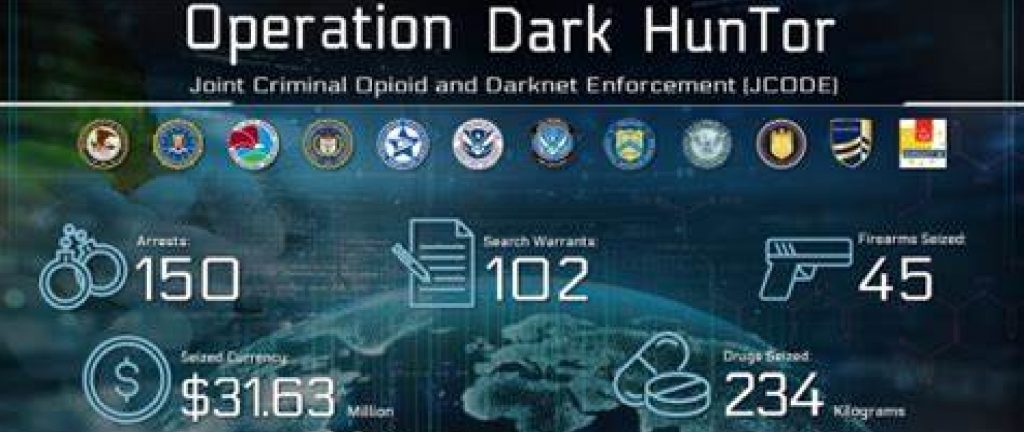
This operation, which was part of a larger attack on illegal internet markets, came after the removal of other notorious websites, such as Berlusconi and DeepSea.
Operation Dark HunTor was developed by the FBI, Europol, and law enforcement organizations from various countries, including the UK, Germany, and the Netherlands. As part of a larger campaign against illegal internet marketplaces, this operation came after the removal of other notorious websites such as Berlusconi and DeepSea.
Operation Dark HunTor was developed by the FBI, Europol, and law enforcement organizations from various countries, including the UK, Germany, and the Netherlands. As part of a larger campaign against illegal internet marketplaces, this operation came after the removal of other notorious websites such as Berlusconi and DeepSea.
The primary objective of Operation Dark HunTor was to disrupt the illegal dark web marketplace ecosystem and bring charges against those responsible for developing and using these platforms. The operation resulted in the seizure of millions of dollars worth of cash and cryptocurrencies, as well as narcotics, guns, and other illegal goods, and hundreds of arrests throughout the world.
Operation Dark HunTor marked a significant turning point in the ongoing fight against illegal dark web organizations. It highlighted how important and effective international cooperation is in the fight against cybercrime. The inquiry also served as a warning to consumers and operators of illegal dark web markets that online anonymity is not always assured. The strategies used by law enforcement to combat cybercrime are always being improved.


